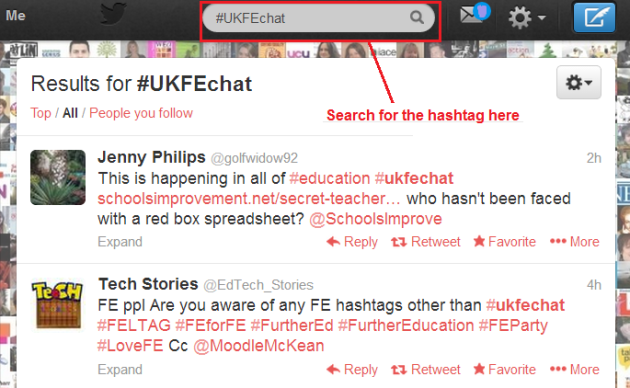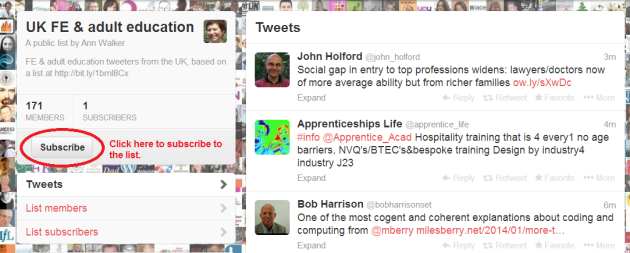Twitter shortcuts, lists and hashtags for adult educators
May 23, 2015 3 Comments
Twitter is a quick and convenient way of keeping up to date with developments in adult education but it can feel overwhelming and could be a relentless time-eater for anyone trying to keep up with every message. Experienced tweeters can seem to be glued to their timelines all day and every day but there are ways to avoid getting drawn into reading every tweet in the never-ending stream. We do actually get on with our work as well as tweeting about it!
Setting aside specific times for catching up can be useful in keeping control and there are some useful short cuts to prioritise what to read when time is tight.
Lists
Using lists such as the one shown below, which collates tweets about UK FE and adult education (available here), can highlight the most relevant messages about a particular theme. Instructions for making lists can be found here. It’s possible to read all of someone’s tweets via a list without following them directly and lists can be public or private.
Searching
Seasoned Twitter users know that using the ‘search’ option and hashtags is another good way to keep track of developments or to follow the progress of relevant events without wasting too much time. The ‘search’ bar is near the top right of a desktop, laptop or tablet screen as shown in red below. The magnifying glass symbol on a mobile phone’s Twitter app does the same job.
There’s a guide to using hashtags here.
Typing a hashtag such as #adultlearning in the search bar will provide a filtered list of relevant tweets from worldwide contributors. Using this approach broadens horizons and can give interesting international perspectives.
Many adult educators have been using the hashtag #adulted as quick way to filter and find relevant tweets including messages from people who they might not be following directly. The hashtag has been hijacked recently by people posting images of pneumatic female contortionists so there has been a migration to #adultedu. This hashtag is used predominantly by tweeters from the USA and UK. Europeans and some Brits seem to prefer #lifelonglearning. This avoids the spam-attracting word ‘adult’ but uses up more of Twitter’s 140 character limit leaving less space for other text.
Questions
It would be good to get some consistency. Which of the options do you prefer – #adultlearning, #adulted, #adultedu or #lifelonglearning or do you use another?
There are various lists of tweeters and bloggers, but is there a list of useful hashtags such as #ukfechat, #adultliteracy, #communitylearning, #familylearning, #loveFE and #lovetolearn?
Top Tweets and Live Tweets
Having searched for hashtags, it’s easy to miss the options of filtering the results by the available categories, noting that there is often a difference between ‘Top’ tweets and ‘Live’ tweets. ‘Top’ tweets are those that lots of people are interacting with and sharing via retweets, replies and wider conversations. ‘Live’ tweets are more comprehensive and recent but have not prompted as much online response at the time of the search.
 Choosing the ‘Accounts’ category linked to a hashtag can be a good way to find appropriate people to follow.
Choosing the ‘Accounts’ category linked to a hashtag can be a good way to find appropriate people to follow.
All this filtering and finding helps to pinpoint the most pertinent updates but sometimes it’s good to sample the whole Twitter stream. I follow some very interesting, opinionated and entertaining people who have all sorts of perspectives and there is a risk of using social media as an echo chamber if we only follow narrow interests or ideas.
P.S.
@MHFEwhatsnew got in touch via Twitter with some more useful links after this blog was published.









Recent Comments